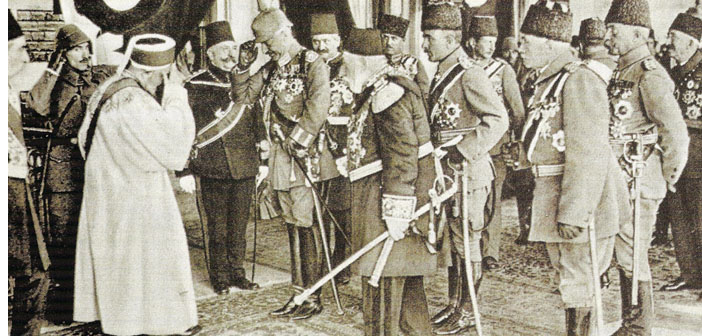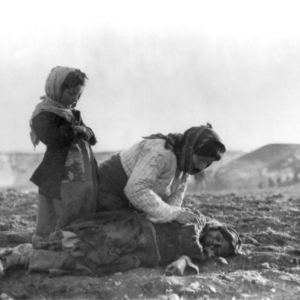When I visited Marburg three years ago, I had short discussion with many young German scholars. Most were aware of the Genocide and their country’s responsibility in being silence during that era. I can’t say they were feeling guilty but at least the current generation was openly talking about those »dark days« even linking it to the atrocities committed by the Nazis. Some also believed that it was Germany’s moral duty to recognize those tragic events of 1915-1916 as Genocide.
This year I had the chance to read Stefan Ihrig’s book »Justifying Genocide: Germany and Armenians from Bismarck to Hitler«. For Ihrig the Armenian Genocide and the Jewish Holocaust are connected. The well researched book explains that for many Germans, in the beginning of the 20th century, the Armenians represented an explicitly racial problem and despite the Armenians’ Christianity, Germans portrayed them as the »Jews of the Orient.« Coming to the Genocide, Stefan Ihrig reveals that German nationalists first denied and then justified genocide claiming that »Armenians stab in the back of the Turks«. Same, accusation Nazis did later to justify the crimes against Jews and Socialists. The Nazis in their version of history praised how the cleansing of the Armenians and Greeks made possible the astonishing rise of the »New (ethnically homogenous) Turkey«.
Violence against the Ottoman Armenians and other Christian minorities from 1890s onward, and how it was understood, served as a major case in redefining Germany’s imperial policy along the conviction that the »killing of certain peoples under certain circumstances could be considered acceptable«. The planned and partially built Baghdad railway, connecting Berlin to Baghdad was to become a key tool for German ambitions as well as a sphere of imperial-colonial projections. The Armenians continued to be sacrificial lamb on the altar of intensifying German-Ottomans relations and German imperial policies.
Even at the time of the deportations and massacres (1915-1916) German diplomats in the Ottoman Empire recognized what was happening as »the total annihilation of a people«. That is what we would now describe as Genocide. To take as a basic definition the one the UN has enshrined in the 1948 Genocide Convention, »acts committed with intent to destroy in whole or in part, a national, ethnical, racial or religious group.« The German language before 1940s had alternative words for »Genozid« such as »Völkermord« which translates as genocide or »Ausrottung/Vernichtung eines Volkes« which translates as »annihilation/extermination of a people« or »extermination measures« and »total extermination« translated respectively as »Ausrottungsmassregeln« and »seine völlige Vernichtung«. German officials in Berlin ignored these phrases and the reports of their diplomats claiming that their only aim was to hold Turkey at their side until the end of the war, regardless of whether the Armenians perish over that or not.

Armenians were the “Jews of the Orient” in German discourse
»Who after all remembers the annihilation of the Armenians?«
In 2015, for strategic reasons, the governing coalition postponed the resolution in order to avoid a confrontation with Turkey at a time when large numbers immigrants were flooding to Germany and other EU countries. The fact that Germany and the EU have signed a deal with Turkey on refugees – a deal that officials in Ankara have repeatedly threatened to withdraw from – puts additional pressure on Merkel’s government. Moreover, Germany’s chancellor came under fire for agreeing to Turkey’s request for prosecution of German comedian Jan Böhmermann who criticized Turkish President Erdogan. On the other hand, German officials criticized Erdogan’s authoritarian rule and the exacerbating of minority rights record in Turkey. Thus, the latest developments caused some friction between the German-Turkish relations.
On the 24th of May, Vice President of the German Bundestag, Edelgard Bulmahn visited the Armenian Genocide museum-institute in Yerevan where she stated that the aim of her parliament’s official recognition of the Armenian Genocide is also linked to prevent the repetition of similar crimes in the future.
For the first time, the conservative Christian Democratic Union (CDU), Christian Social Union (CSU) parties, center-left Social Democrats and Greens agreed on a resolution. Greens co-chair Cem Özdemir was one of the key players in the drafting of this resolution. His Party pushed to include the following sentence in the resolution: »The German Bundestag regrets the inglorious role of the German Reich, which, despite unequivocal information, including from German diplomats and missionaries, about the organized expulsion and extermination of the Armenians, did not attempt to stop these crimes against humanity.« Meanwhile, the German Bundestag website indicates that an hour has been set aside on June 2 for agenda item No. 5: »Remembrance and Commemoration of the Genocide of Armenians and Other Christian Minorities 101 Years Ago.«
It should be very well understood that the recognition of the Armenian Genocide is a moral duty for Germany. Germany was the ally of the Ottoman Turkey. Its archives recently are being researched by many scholars, most from German background. Many young scholars are discovering the role of the German Reich during the Genocide and opening the door towards academic discussions and conferences. Unlike many political analysts, who may argue that the Bundestag resolution may threaten the German-Turkish relations, I believe else. The recognition is very important to push Turkey to put an end to the denial and further raise awareness about recent persecutions and genocides that are happening against certain minorities in the Middle East.
Adolf Hitler in a chilling remark made in 1939, proclaimed: »Who after all remembers the annihilation of the Armenians?« I’m sure that Germans will respond claiming »we all remember and recognize our responsibility in the Armenian Genocide».
The article originally was published in zenithonline
Yeghia Tashjian has graduated from Haigazian University in political science. He is a Lebanese-Armenian political activist, researcher and blogger. He has founded the New Eastern Politics forum/blog in 2010. Currently, he is the regional officer of Women in War gender-based think tank, and research assistant at Armenian Diaspora Research Center at Haigazian University. He is also contributor to many local and regional newspapers and blogs.







